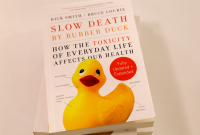Support strong Canadian climate journalism for 2025
Some of Canada's biggest retailers started testing alternatives to receipt paper that's coated in potentially dangerous chemicals, as pressure mounts for them to phase it out by the end of this year.
"We urge you to take immediate steps to stop using thermal paper containing bisphenols for receipts and other paper products in Canada," reads a letter from a conglomerate of health, labour and environmental groups sent to 13 retailers, including major grocers and fast-food chains.
"BPA is a hormone-disrupting chemical that can interfere with the critical function of hormones in the human body and has been found to damage fertility, harm the fetus, and cause adverse health outcomes including cancers of the breast and prostate, diabetes, and attention deficit hyperactivity disorder (ADHD) in children."
Bisphenol A (BPA) is an industrial chemical that is used in making polycarbonate, a type of plastic, and epoxy resins.
The Canadian government declared BPA a toxic chemical in October 2010, finding it "constitutes or may constitute a danger to human health and the environment" based on criteria set out in the Canadian Environmental Protection Act. The government made it illegal to manufacture, import, advertise or sell baby bottles with the chemical that same year.
Some retailers removed BPA-coated receipt paper, but replaced it with nearly identical bisphenol substances, like BPS, according to the groups, which include Environmental Defence, the United Food and Commercial Workers Canada, and Breast Cancer Action Quebec. They say these coatings pose a risk to retail workers and consumers.
"The notion that ... by doing one's job that one is being exposed to these toxins would quite naturally concern us," said Derek Johnstone, a spokesman for the UFCW Canada, which represents thousands of cashiers.
"It's something that is within the control of all major retailers in Canada," he said, adding he'd like to see companies commit to a timeline for removing these chemicals from their receipts.
Loblaw Companies Ltd., one of the companies the letter targeted, stopped using BPA receipts in 2012, wrote spokeswoman Catherine Thomas in an email.
It plans to transition away from bisphenol-coated receipts completely in the future and is already testing alternative papers, she said, adding the company also offers electronic-receipt or no receipt options at almost all of its stores now, and offers workers gloves.
She declined to provide a timeline for when Loblaw would no longer use bisphenol-coated receipts, saying the company is in the early stages of testing.
The Home Depot Canada's receipts have been BPA-free for more than a decade, wrote spokeswoman Erika Botond in an email, adding "they are in complete compliance with all regulations." She did not answer whether the receipt paper is coated with BPS or other bisphenol substances.
Cineplex Inc., Metro Inc., Walmart Canada Corp. and McDonald's Canada deferred questions to the Retail Council of Canada.
Many retailers have switched to BPA-free paper, while others intend to stop using bisphenol-coated paper completely and have started testing alternatives, wrote spokesman Andrew Telfer.
The council would not answer questions about the four companies that deferred questions to it.
It "does not otherwise comment on business decisions including the sourcing of supplies and equipment," he said.
Seven other companies who received the letter — A&W Food Services of Canada Inc., Best Buy Canada Ltd., Canadian Tire Corp. Ltd., Costco Wholesale Canada Ltd., Empire Co. Ltd., Lowe's Canada and Restaurant Brands International Inc. — did not immediately respond to a request for comment.





Comments
Oh dear, the resurrection of the BPA hysteria.
Here's what Health Canada actually said about BPA:
https://www.canada.ca/en/health-canada/services/food-nutrition/food-saf…
For those disinclined to click the link:
"Health Canada's Food Directorate has concluded that the current dietary exposure to BPA through food packaging uses is not expected to pose a health risk to the general population, including newborns and infants.
However, due to the uncertainty raised in some *animal studies* relating to the potential effects of low levels of BPA, the Government of Canada is taking action to enhance the protection of infants and young children. It is therefore recommended that the general principle of ALARA (as low as reasonably achievable) be applied to continue efforts on limiting BPA exposure from food packaging applications to infants and newborns, specifically from pre-packaged infant formula products *as a sole source food*, for this sensitive segment of the population."
[*emphasis mine*]
If dietary exposure though food packaging is not expected to pose a health risk, how is handling a thermal-paper receipt worse?
BTW, this is an old panic first raised at least 5 years ago.
https://www.acsh.org/news/2014/10/22/avoid-thermal-paper-cash-receipts-…